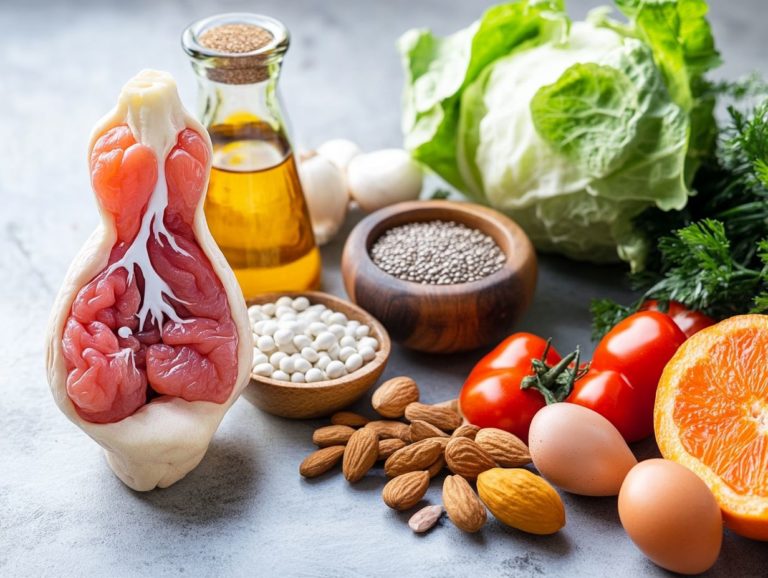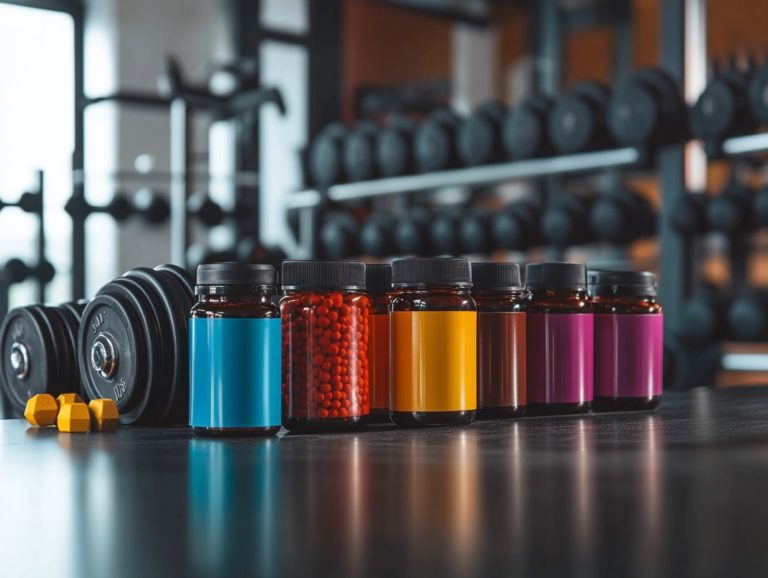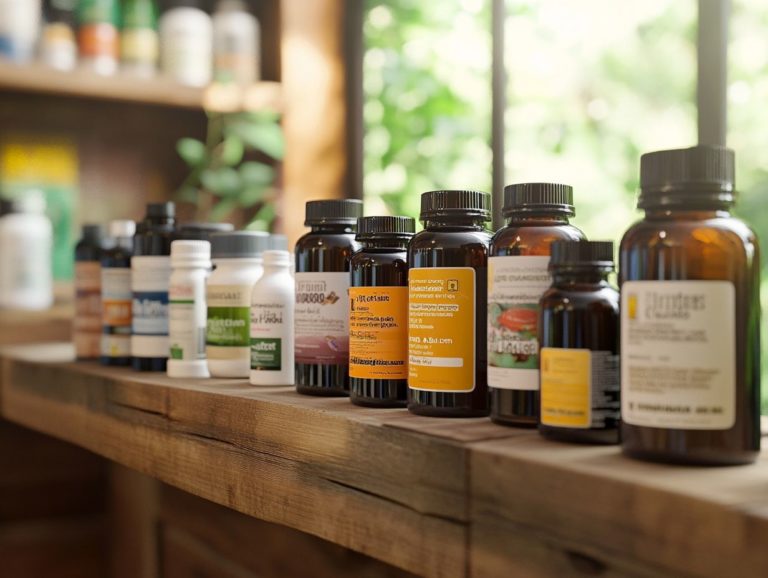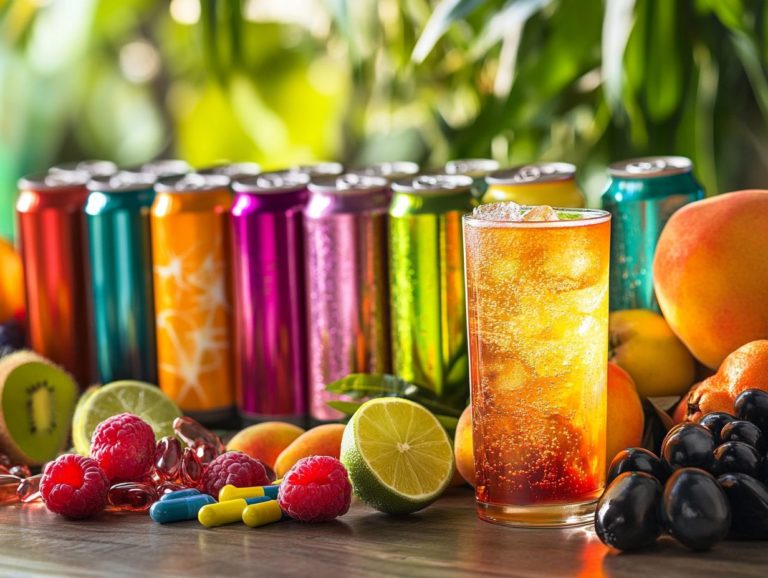5 Best Supplements for Energy and Stamina
Feeling drained and lacking energy? You re not alone. Many people seek ways to boost their energy and stamina.
This article explores five top supplements that can revitalize your body and enhance performance. From creatine to ginseng, discover how each one can help, including dosages, side effects, and natural alternatives.
Get ready to learn how to recharge and feel your best!
Contents
- Key Takeaways:
- 1. Creatine
- 2. Iron
- 3. Vitamin B12
- 4. Coenzyme Q10
- 5. Ginseng
- How Can These Supplements Help with Energy and Stamina?
- Frequently Asked Questions
- What are the 5 best supplements for energy and stamina?
- How does ashwagandha help with energy and stamina?
- What is the recommended dosage for caffeine as a supplement for energy and stamina?
- Can creatine help improve energy and stamina for physical activities?
- Why is iron important for energy and stamina?
- Is vitamin B12 beneficial for energy and stamina?
Key Takeaways:
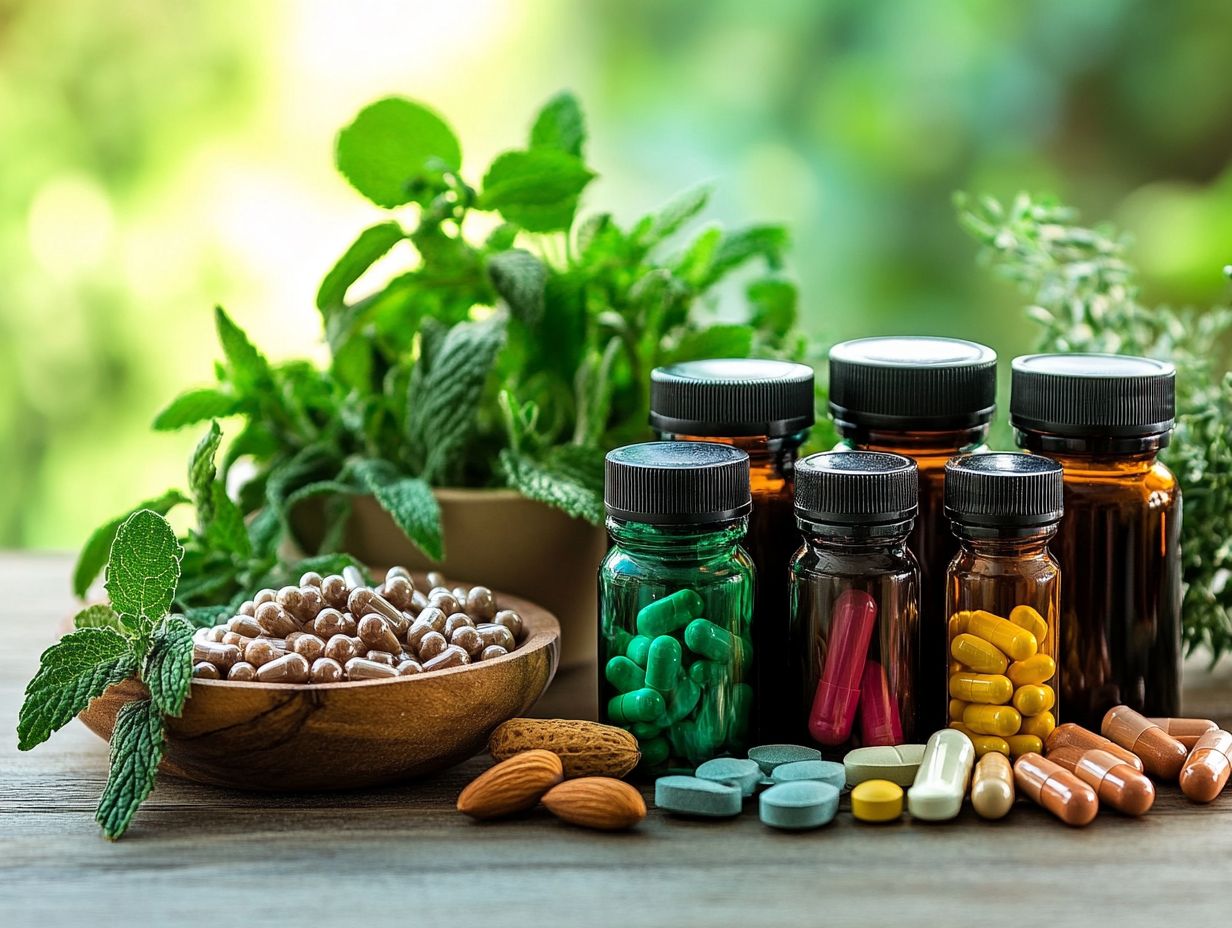
Boost energy and stamina with these top 5 supplements. Always consult a healthcare professional before starting a new regimen, as potential side effects like upset stomach and headaches can occur.
1. Creatine
Creatine is a popular supplement known for enhancing physical performance, especially during intense workouts. It may also support cognitive function, making it a great choice for those struggling with fatigue.
This compound boosts ATP, the energy currency of your body. According to Megan Nunn, PharmD, creatine helps regenerate ATP during strenuous activity, delaying fatigue.
Research by Melissa Nieves, LND, shows that creatine can also improve cognitive processes, particularly for those with low energy. By offering extra energy support, it may enhance mental clarity and focus.
2. Iron
Iron is essential for transporting oxygen in your blood. A deficiency can lead to anemia, causing fatigue and low energy levels.
Understanding iron’s role is crucial for your vitality. Symptoms like weakness, dizziness, or pale skin might signal a deficiency.
Incorporating iron-rich foods like red meat, lentils, and spinach is wise. If you can’t meet your needs through diet, supplementation can help restore your energy.
Always consult a healthcare provider before starting supplements, as too much iron can cause gastrointestinal issues or even organ damage.
3. Vitamin B12
Vitamin B12 is vital for energy production and cognitive function. If you’re fatigued, consider this vitamin, as a deficiency can greatly affect your well-being.
This vitamin supports red blood cell formation and helps keep your nerve cells healthy, boosting memory and concentration. Signs of deficiency include weakness and confusion; supplementation might help improve cognitive performance.
Approach supplementation carefully. Consult healthcare professionals to determine the right dosage based on your health needs.
4. Coenzyme Q10
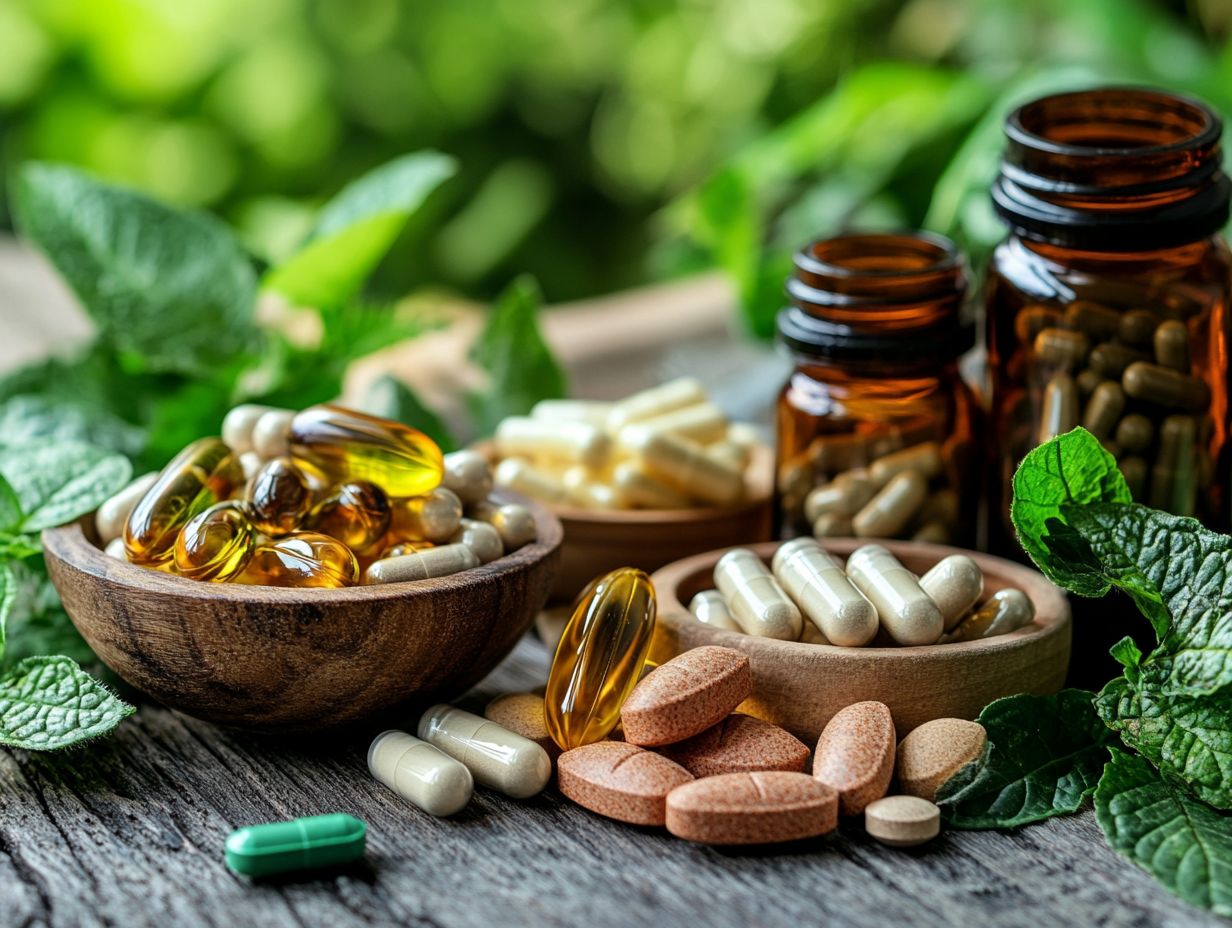
Coenzyme Q10 (CoQ10) is a naturally occurring antioxidant in your body that plays a pivotal role in cellular energy production. This makes it a sought-after supplement for anyone looking to boost their energy levels and alleviate fatigue, particularly in cases of chronic fatigue syndrome.
This powerful coenzyme helps convert nutrients into adenosine triphosphate (ATP), which your body uses for energy. This process is essential for sustaining your stamina and vitality. Many people report enhanced endurance and reduced fatigue after incorporating this supplement into their daily routine.
Research indicates that CoQ10 s antioxidant properties not only help combat oxidative stress but may also enhance cardiovascular health by supporting heart function. Interestingly, various studies suggest that supplementation can lead to improved energy levels, especially in older individuals and those with specific medical conditions.
While generally considered safe, it s wise to be aware of potential side effects, such as gastrointestinal discomfort, and possible interactions with blood thinners or other dietary supplements. This underscores the importance of consulting a healthcare professional before starting any new regimen.
5. Ginseng
Ginseng, a revered herbal supplement, has long been celebrated for its potential to elevate energy levels and combat fatigue while enhancing cognitive function. Many people naturally turn to this remedy to boost their stamina.
Among the various types available, American ginseng (Panax quinquefolius) is particularly favored for its soothing effects and gentle stimulation. It often aids in reducing anxiety while promoting mental clarity.
On the other hand, Asian ginseng (Panax ginseng) is recognized for its invigorating properties, delivering a more robust energizing effect.
Scientific studies are beginning to validate these ancient claims, revealing that both varieties can significantly enhance physical endurance and cognitive capabilities contributing to a more balanced and productive lifestyle.
Ongoing research is delving deeper into the specific mechanisms behind these roots’ beneficial effects, ensuring that ginseng remains a focal point of interest in both traditional and modern medicinal practices.
How Can These Supplements Help with Energy and Stamina?
Various dietary supplements, including creatine, iron, vitamin B12, Coenzyme Q10, and ginseng, can significantly elevate your energy levels and stamina. For optimal results, consider the 5 best supplements for post-workout recovery, which provide invaluable support, especially for those grappling with fatigue or chronic fatigue syndrome, while also enhancing cognitive function.
Take creatine, for instance. It s renowned for its ability to boost energy production during high-intensity workouts, helping you maximize your performance. A study published in the Journal of Sports Science revealed that participants who added creatine to their regimen experienced notable gains in both strength and recovery times.
Iron is another crucial player; it s essential for transporting oxygen in your blood. When levels run low, exhaustion and diminished stamina can follow. A review in Nutrition Reviews found that iron supplementation could revitalize energy levels in those facing deficiency.
Vitamin B12 deserves a mention too it s linked to improved mood and cognitive clarity. Many users report enhanced focus on demanding tasks after incorporating it into their diet.
Coenzyme Q10 works at a cellular level, revitalizing energy production and is particularly beneficial for older adults, as evidenced by research from Free Radical Research.
And let’s not overlook ginseng, celebrated in traditional medicine for its fatigue-fighting properties, with modern studies corroborating its ability to boost physical endurance and overall vitality.
Together, these supplements underscore the pivotal role dietary interventions play in elevating your quality of life. Don t miss out on the benefits of these powerful supplements!
What Are the Recommended Dosages for Each Supplement?
Understanding the recommended dosages for dietary supplements like vitamin B12, iron, and creatine is essential for maximizing their benefits while keeping potential side effects at bay. It’s really important to consult with a healthcare provider for personalized recommendations.
Take vitamin B12, for instance. The general recommendation is 2.4 micrograms per day for adults. However, if you re over 50 or have gastrointestinal issues, you may need higher doses to prevent deficiency.
Similarly, the dosage for iron supplements can vary significantly, typically ranging from 8 to 18 mg daily. This is influenced by factors like age, gender, and specific health conditions such as anemia. Tailoring these dosages according to your lifestyle factors, including activity level and dietary habits, is crucial.
This approach ensures that your unique circumstances are considered for optimal results, allowing you to harness the full potential of these supplements.
What Are the Possible Side Effects of These Supplements?

While dietary supplements such as vitamin B12, creatine, and iron can provide notable benefits, it’s essential to remain mindful of the potential side effects that may accompany their use. This awareness helps you make informed decisions about your supplementation regimen.
For example, vitamin B12 might occasionally lead to mild digestive issues or skin irritations. Creatine, while effective for enhancing muscle performance, could cause gastrointestinal discomfort or cramping for some people. Excessive iron intake may result in constipation or, in severe cases, complications if not monitored carefully.
This highlights the importance of sticking to the recommended amounts, as overconsumption can lead to undesirable health consequences.
If you’re considering these supplements especially with existing health conditions don’t wait talk to your healthcare provider today. Their expert guidance can help you create a tailored approach, minimizing risks while maximizing potential benefits.
Can These Supplements Be Taken Together?
Understanding whether supplements like vitamin B12, creatine, and iron can be taken together is crucial for optimizing their effects. Exploring how they can work well together can lead to improved health outcomes.
As you navigate the world of supplementation, it’s essential to examine not just the individual advantages of each but also how they interact. For instance, vitamin B12 plays a vital role in energy metabolism, creatine enhances muscle strength and performance, and iron is essential for oxygen transport throughout the body.
When assessing compatibility, remember that high doses of iron may interfere with the absorption of certain B vitamins. Research suggests that combining these supplements can be beneficial, particularly for athletes and individuals with specific dietary restrictions, as long as they are taken in appropriate amounts and at the right times.
It’s always wise to consult with a healthcare provider for personalized advice to avoid any adverse effects and maximize your well-being.
How Long Does It Take to See Results from These Supplements?
The time frame for seeing results from dietary supplements such as creatine, iron, and vitamin B12 can vary considerably based on your individual circumstances. This includes your existing energy levels and overall health, making it essential to set realistic expectations.
For instance, while some may notice improvements within a few weeks, others might find that it takes several months before they experience significant benefits. Key factors like your diet, physical activity level, and any pre-existing health conditions play a crucial role in determining these timelines.
Research suggests that if you re following a balanced diet rich in whole foods, you might see results more quickly compared to someone dealing with deficiencies. Additionally, lifestyle factors like stress management and hydration can greatly influence how effectively your body absorbs and utilizes these supplements.
This emphasizes the importance of adopting a holistic approach to supplementation for optimal results.
Are There Any Natural Alternatives to These Supplements?
If you re looking for natural ways to boost your energy and stamina, many foods and herbal supplements can help fight fatigue.
Incorporating nutrient-rich foods like quinoa can give you sustainable energy throughout the day.
Herbs like ginseng and ashwagandha help your body manage stress and maintain energy.
Unlike synthetic supplements, natural options usually have fewer side effects. If you prefer whole foods, these alternatives can work wonders without pills or powders.
Frequently Asked Questions
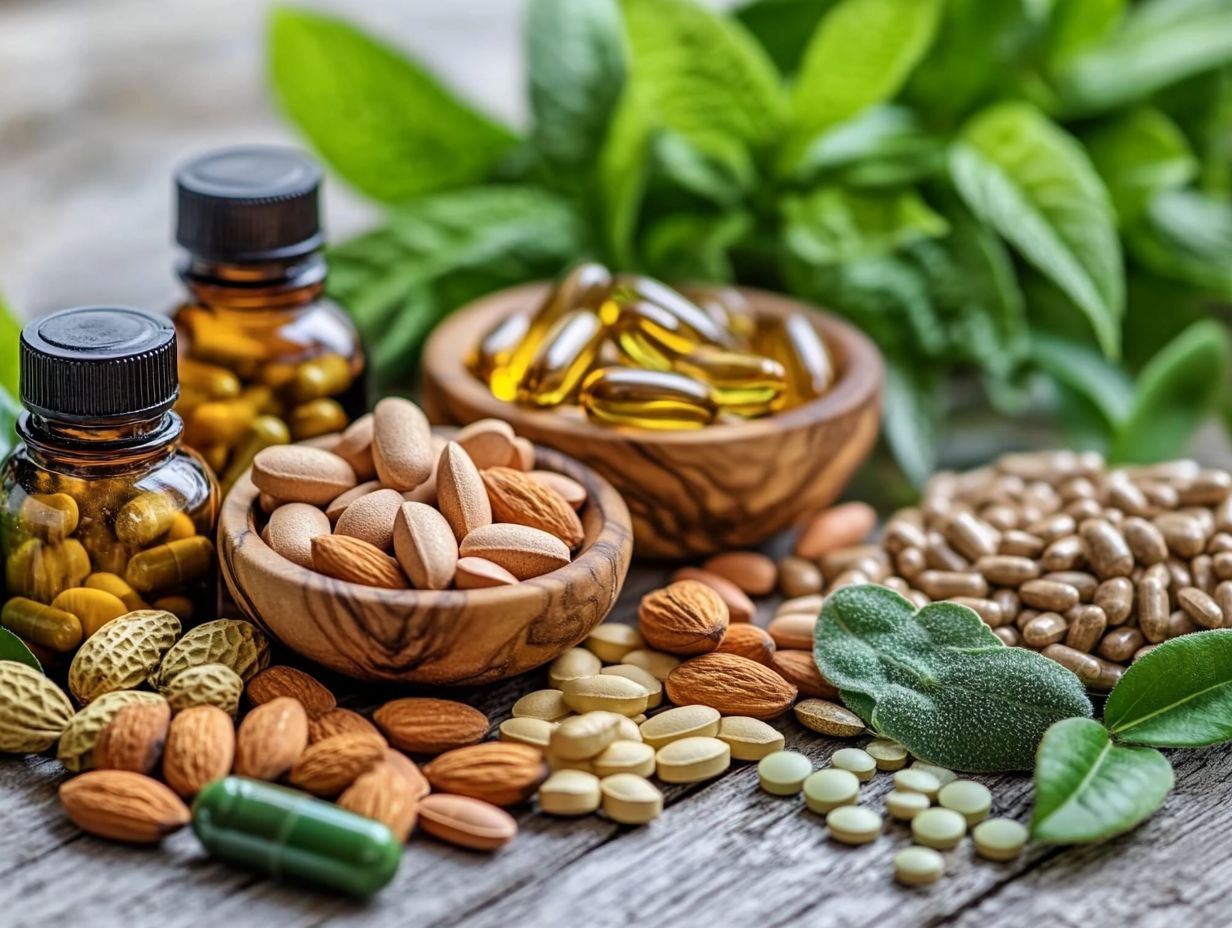
What are the 5 best supplements for energy and stamina?
The top five supplements for boosting energy and stamina are ashwagandha, caffeine, creatine, iron, and vitamin B12.
How does ashwagandha help with energy and stamina?
Ashwagandha helps your body handle stress and fatigue, which can improve your energy levels.
What is the recommended dosage for caffeine as a supplement for energy and stamina?
For energy and stamina, the recommended caffeine dosage is 200-400mg per day in divided doses.
Can creatine help improve energy and stamina for physical activities?
Yes, creatine boosts ATP production, which is crucial for muscle energy during physical activities.
Why is iron important for energy and stamina?
Iron is vital for producing hemoglobin, which carries oxygen to your muscles. Without enough iron, you may feel fatigued and less energetic.
Is vitamin B12 beneficial for energy and stamina?
Absolutely! Vitamin B12 is essential for making red blood cells that supply energy. Low B12 levels can lead to fatigue.

